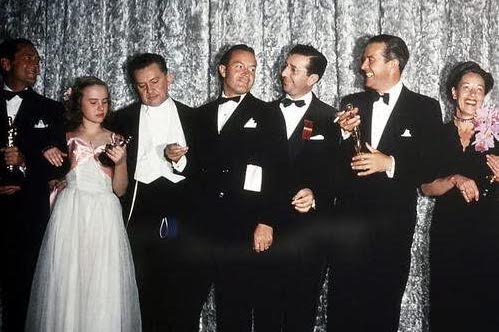by Baby Clyde
 Bob Hope and the 1945 winners
Bob Hope and the 1945 winners
The war was over and finally Hollywood could get around to more important matters like giving Joan Crawford an Oscar.
It had been a pared down ceremony for the preceding few years with tuxes and ballgowns discouraged. Even the statuette itself had been made from plaster rather than gold plated bronze but at the 18th Academy Awards, which took place at Graumann’s Chinese Theatre 75 years ago today, the glamour was back and there was no one more glamorous in town than 20 year veteran Joan. She skipped the ceremony...
After 18 years as one of MGM’s biggest stars the 40’s had been rocky for Miss Crawford. A string of flops led to her leaving the studio by mutual consent and signing with Warner Bros, home to her arch-rival Bette Davis. Determined to work on better scripts that she had been handed at MGM she refused all offers for 18 months before campaigning to be cast in Mildred Pierce a role reigning studio queen Davis had turned down, even consenting to a screen test. Playing the self-sacrificing mother to a spoilt daughter the gamble paid off and she received the best reviews of her career.
Smelling gold, Joan left nothing to chance. Her publicist Henry Rogers was tasked with generating buzz. Phone calls were made, Hedda Hopper was tipped off and the modern Oscar campaign was born. By the night of the ceremony the Best Actress statuette seemed in the bag, but nervous the community wouldn’t rally behind her Joan feigned illness and stayed at home, even telling the press the unlikely tale that she had voted for Ingrid Bergman. She needn’t have worried. There was hearty applause in the audience as Charles Boyer announced her name. The award was collected by her Mildred Pierce director Michael Curtiz.


Whist Joan may have garnered all of the headlines the real star of the show was Austrian émigré Billy Wilder with his dipso drama The Lost Weekend. When the nominations were announced it looked like a repeat of the previous year with Wilder going head to head against Leo McCarey in all of the major awards. In 1944 McCarey had come up trumps with his sickly sweet, god bothering dramedy Going My Way whereas Wilder went home empty handed for his hard as nails noir classic Double Indemnity, losing Picture, Director and Screenplay. The tables were turned in 1945. Despite being the year’s biggest hit, Going My Way’s sequel The Bells of St Mary’s lost 7 of its 8 nominations, only winning for Sound Recording. The Lost Weekend on the other hand won Best Picture for its producer Charles Brackett, Best Director for Billy Wilder and the pair shared the Best Screenplay award. These were the first of Wilder’s eventual six competitive Oscar wins.
The hard hitting tale of an alcoholic writer’s weekend long bender, the film had an almost documentary style with much of it shot on location around New York dive bars. It got raves from the critics and was awarded Best Picture at the NYFC’s and Golden Globes, but the most fulsome praise went the film’s star Ray Milland.
Welsh born Milland had been a lightweight B List leading man for a decade at this point but never been given the opportunity to show off his real acting chops. Cast completely against type he stunned movie goers with his devastating portrayal of a desperate drunk. Having swept all the precursors his win on Oscar night came as no surprise.


It was indeed a year for veterans as the Supporting awards also went to actors who had more than paid their dues. Starting off on Broadway in the late 20’s James Dunne had been a big star at Fox in the early 30’s. Known as ‘America’s Boyfriend’ he appeared with some of the studios biggest names including the first three films of future box office queen Shirley Temple, but his career slumped in the second half of the decade due to his excessive drinking. Ironically, this came in handy for his Oscar winning role as the amiable alcoholic father in Elia Kazan’s debut A Tree Grows In Brooklyn.
Best Supporting Actress was Anne Revere a theatre actress who had decamped to Hollywood in the early 40’s and made a name for herself playing mothers of some of the biggest stars in town. Her win was for playing the mother of 12 year old Elizabeth Taylor in her breakthrough role. Considering the films popularity and her subsequent legendary career you’d think that Taylor may have been the recipient of the years Juvenile Award, but it was in fact presented to a young lady barely 3 weeks older than Taylor.
Proving that the Academy is not always the best predictor of future success, Peggy Ann Garner was presented with a thoroughly deserved miniature statuette for playing the adoring daughter of Dunne’s character in A Tree Grows In Brooklyn (I’d have given her Best Actress. Sorry Joan).
With The Lost Weekend taking home 4 big awards the only other multiple award winner was National Velvet which won Best Editing to go with Revere’s Supporting victory. The rest of the Oscars were spread evenly around with every Best Picture nominee winning at least one award for the first time ever.

Whilst The Academy was busy sharing the wealth Joan Crawford had been busy making a sensational recovery from the ‘pneumonia’ which had prevented her from attending the ceremony. With hair and make-up people conveniently standing by, she looked suitably stunning when Curtiz delivered the statuette to her boudoir, photographers in tow. She was on the front page of every newspaper the next morning. Whilst it may have taken a while to convince the industry of her acting talent there was never any doubt that she was always a top class MOVIE STAR.